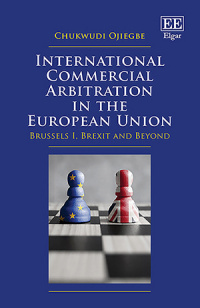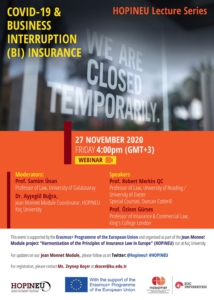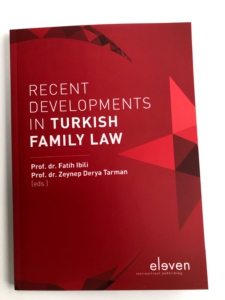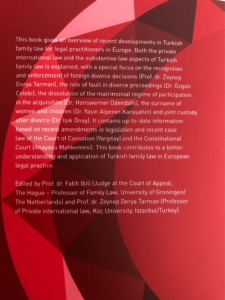| Balbi, Francesca |
“La circolazione delle decisioni a livello globale: il progetto di convenzione della Conferenza dell’Aia per il riconoscimento e l’esecuzione delle sentenze straniere” (Tesi di dottorato, Università degli Studi di Milano-Bicocca, 2019; available: here) |
| Beaumont, Paul |
“Forum non Conveniens and the EU rules on Conflicts of Jurisdiction: A Possible Global Solution”, Revue Critique de Droit International Privé 2018, pp 433-447 |
| Beaumont, Paul R. |
“Judgments Convention: Application to Governments”, Netherlands International Law Review (NILR) 67 (2020), pp 121-137 |
| Blom, Joost |
“The Court Jurisdiction and Proceedings Transfer Act and the Hague Judgments and Jurisdictions Projects”, Osgoode Hall Law Journal 55 (2018), pp 257-304 |
| Bonomi, Andrea |
“European Private International Law and Third States”, Praxis des Internationalen Privat- und Verfahrensrechts (IPRax) 2017, pp 184-193 |
| Bonomi, Andrea |
“Courage or Caution? – A Critical Overview of the Hague Preliminary Draft on Judgments”, Yearbook of Private International Law 17 (2015/2016), pp 1-31 |
Bonomi, Andrea;
Mariottini, Cristina M. |
“(Breaking) News From The Hague: A Game Changer in International Litigation? – Roadmap to the 2019 Hague Judgments Convention”, Yearbook of Private International Law 20 (2018/2019), pp 537-567 |
Borges Moschen, Valesca Raizer;
Marcelino, Helder |
“Estado Constitutional Cooperativo e a conficaçao do direito internacional privado apontamentos sobre o ’Judgement Project’ da Conferência de Haia de Direito Internacional Privado”, Revista Argumentum 18 (2017), pp 291-319
(Cooperative Constitutional State and the Codification of Private International Law: Notes on the “Judgment Project” of the Hague Conference on Private International Law) |
| Brand, Ronald A. |
“The Circulation of Judgments Under the Draft Hague Judgments Convention”, University of Pittsburgh School of Law Legal Studies Research Paper Series No. 2019-02, pp 1-35 |
| Brand, Ronald A. |
“Jurisdictional Developments and the New Hague Judgments Project”, “in HCCH (ed.), A Commitment to Private International Law – Essays in honour of Hans van Loon”, Cambridge 2013, pp 89-99 |
| Brand, Ronald A. |
“New Challenges in Recognition and Enforcement of Judgments”, in Franco Ferrari, Diego P. Fernández Arroyo (eds.), Private International Law – Contemporary Challenges and Continuing Relevance, Cheltenham/Northampton 2019, pp 360-389 |
| Brand, Ronald A. |
“Jurisdiction and Judgments Recognition at the Hague Conference: Choices Made, Treaties Completed, and the Path Ahead”, Netherlands International Law Review (NILR) 67 (2020), pp 3-17 |
Çali?kan, Yusuf;
Çali?kan, Zeynep |
“2 Temmuz 2019 Tarihli Yabanci Mahkeme Kararlarinin Taninmasi ve Tenfizine Iliskin Lahey Anlasmasinin Degerlendirilmesi”, Public and Private International Law Bulletin 40 (2020), pp 231-245
(An Evaluation of 2 July 2019 Hague Convention on the Recognition and Enforcement of Foreign Judgments in Civil or Commercial Matters) |
| Clavel, Sandrine; Jault-Seseke, Fabienne |
“La convention de La Haye du 2 juillet 2019 sur la reconnaissance et l’exécution des jugements étrangers en matière civile ou commerciale: Que peut-on en attendre?”, Travaux du comité français de Droit international privé, Vol. 2018-2020, forthcoming (Version roviso ire de la communication présentée le 4 octobre 2019 available here) |
| Clover Alcolea, Lucas |
“The 2005 Hague Choice of Court and the 2019 Hague Judgments Conventions versus the New York Convention – Rivals, Alternatives or Something Else?”, Mc Gill Journal of Dispute Resolution 6 (2019-2020), pp. 187-214 |
| Coco, Sarah E. |
“The Value of a New Judgments Convention for U.S. Litigants”, New York University Law Review 94 (2019), pp 1210-1243 |
| Cuniberti, Gilles |
“Signalling the Enforceability of the Forum’s Judgments Abroad”, Rivista di diritto internazionale private e processuale (RDIPP) 56 (2020), pp 33-54 |
de Araujo, Nadia; de Nardi, Marcelo;
Spitz, Lidia |
“A nova era dos litígios internacionais”, Valor Economico 2019 |
de Araujo, Nadia;
de Nardi, Marcelo;
Lopes Inez;
Polido, Fabricio |
„Private International Law Chronicles“, Brazilian Journal of International Law 16 (2019), pp 19-34
|
de Araujo, Nadia;
de Nardi, Marcelo |
„Consumer Protection Under the HCCH 2019 Judgments Convention”, Netherlands International Law Review (NILR) 67 (2020), pp 67-79 |
de Araujo, Nadia;
de Nardi, Marcelo |
„22ª Sessão Diplomática da Conferência da Haia e a Convenção sobre sentenças estrangeiras: Primeiras reflexões sobre as vantagens para o Brasil da sua adoção“, Revista de la Secretaría del Tribunal Permanente de Revisión 7 No. 14 (2019), páginas 198-221
(22nd Diplomatic Session of The Hague Conference and the Convention on Foreign Judgments: First Reflections on the Advantages for Brazil of their Adoption) |
| Dotta Salgueiro, Marcos |
“Article 14 of the Judgments Convention: The Essential Reaffirmation of the Non-discrimination Principle in a Globalized Twenty-First Century”, Netherlands International Law Review (NILR) 67 (2020), pp 113-120 |
Douglas, Michael;
Keyes, Mary;
McKibbin, Sarah;
Mortensen, Reid |
“The HCCH Judgments Convention in Australian Law”, Federal Law Review 47 (2019), pp 420-443 |
| Efeç?nar Süral |
Possible Ratification of the Hague Convention by Turkey and Its Effects to the Recognition and Enforcement of Foreign Judgments, Public and Private International Law Bulletin 40/2 (2020), pp. 785 et seq. |
| Fan, Jing |
“On the Jurisdiction over Intellectual Property in the Draft Hague Convention on the Recognition and Enforcement of Foreign Judgments”, Chinese Yearbook of Private International Law and Comparative Law 2018-02, pp. 313-337 |
| Franzina, Pietro; Leandro, Antonio
|
“La Convenzione dell’Aja del 2 luglio 2019 sul riconoscimento delle sentenze straniere: una prima lettura”, Quaderni di SIDIblog 6 (2019), pp 215-231, available at http://www.sidi-isil.org/wp-content/uploads/2020/09/Quaderni-di-SIDIBlog-6-2019.pdf
(The Hague Convention of 2 July 2019 on the Recognition of Foreign Judgments: A First Appraisal) |
| Fuchs, Felix |
“Das Haager Übereinkommen vom 2. Juli 2019 über die Anerkennung und Vollstreckung ausländischer Urteile in Zivil- oder Handelssachen“, Gesellschafts- und Wirtschaftsrecht (GWR) 2019, pp 395-399 |
| Garcimartín, Francisco |
“The Judgments Convention: Some Open Questions”, Netherlands International Law Review (NILR) 67 (2020), pp 19-31 |
| Goddard, David |
„The Judgments Convention – The Current State of Play”, Duke Journal of Comparative & International Law 29 (2019), pp 473-490 |
| He, Qisheng |
“The HCCH Judgments Convention and the Recognition and Enforcement of Judgments pertaining to a State”, Global Law Review 3 (2020), pp 147-161 |
| He, Qisheng |
“Unification and Division: Immovable Property Issues under the HCCH Judgement Convention”, Journal of International Law 1 (2020), pp 33-55 |
| Jacobs, Holger |
“Der Zwischenstand zum geplanten Haager Anerkennungs- und Vollstreckungsübereinkommen – Der vorläufige Konventionsentwurf 2016“, Zeitschrift für Internationales Privatrecht & Rechtsvergleichung (ZfRV) 2017, pp 24-30 |
| Jang, Junhyok |
“The Public Policy Exception Under the New 2019 HCCH Judgments Convention”, Netherlands International Law Review (NILR) 67 (2020), pp 97-111 |
| Jang, Junhyok |
“2019 Hague Convention on the Recognition and Enforcement of Foreign Judgments in Civil or Commercial Matters”, Korea Private International Law Journal 25 (2019), pp. 437-510. |
| Jovanovic, Marko |
Thou Shall (Not) Pass – Grounds for Refusal of Recognition and
Enforcement under the 2019 Hague Judgments Convention, YbPIL 21 (2019/2020), pp. 309 – 332 |
| Jueptner, Eva |
“The Hague Jurisdiction Project – what options for the Hague Conference?”, Journal of Private International Law 16 (2020), pp 247-274 |
| Kessedjian, Catherine |
“Comment on the Hague Convention of 2 July 2019 on the Recognition and Enforcement of Foreign Judgments in Civil or Commercial Matters. Is the Hague Convention of 2 July 2019 a useful tool for companies who are conducting international activities?“, Nederlands Internationaal Privaatrecht (NIPR) 2020, pp 19-33 |
| Khanderia, Saloni |
„The Hague judgments project: assessing its plausible benefits for the development of the Indian private international law”, Commonwealth Law Bulletin 44 (2018), pp 452-475 |
| Khanderia, Saloni |
“The Hague Conference on Private International Law’s Proposed Draft Text on the Recognition and Enforcement of Foreign Judgments: Should South Africa Endorse it?”, Journal of African Law 63 (2019), pp 413-433 |
| Mariottini, Cristina |
„Establishment of Treaty Relations under The 2019 Hague Judgments
Convention“, YbPIL 21 (2019/2020), pp. 365-380 |
| Mariottini, Cristina |
“The Exclusion of Defamation and Privacy from the Scope of the Hague Draft Convention on Judgments, YbPIL 19 (2017/2018), pp 475-486. |
| Meier, Niklaus |
“Notification as a Ground for Refusal”, Netherlands International Law Review (NILR) 67 (2020), pp 81-95 |
| Nielsen, Peter Arnt |
“The Hague 2019 Judgments Convention – from failure to success”, Journal of Private International Law 16 (2020), pp 205-246 |
| North, Cara |
“The 2019 HCCH Judgments Convention: A Common Law Perspective”, Praxis des Internationalen Privat- und Verfahrensrechts (IPRax) 2020, pp 202-210 |
| North, Cara |
“The Exclusion of Privacy Matters from the Judgments Convention”, Netherlands International Law Review (NILR) 67 (2020), pp 33-48 |
| Oestreicher, Yoav |
“ ’We’re on a Road to Nowhere’ – Reasons for the Continuing Failure to Regulate Recognition and Enforcement of Foreign Judgments”, The International Lawyer 42 (2008), pp 59-86 |
| Pasquot Polido, Fabrício B. |
“The Judgments Project of the Hague Conference on Private International Law: a way forward for a long-awaited solution”, in Verónica Ruiz Abou-Nigm, Maria Blanca Noodt Taquela (eds.), Diversity and integration in Private International Law, Edinburgh 2019, pp. 176-199 |
| Pertegás Sender, Marta |
“The 2019 Hague Judgments Convention: Its Conclusion and the road ahead”, in Asian Academy of International Law (publ.), Sinergy and Security: the Keys to Sustainable Global Investment: Proceedings of the 2019 Colloquium on International Law, 2019 Hong Kong, pp 181-190 |
| Pertegás, Marta |
“Brussels I Recast and the Hague Judgments Project”, in Geert Van Calster (ed.), European Private International Law at 50: Celebrating and Contemplating the 1968 Brussels Convention and its Successors, Cambridge 2018, pp 67-82 |
| Qian, Zhenqiu |
“On the Common Courts Provision under the Draft Hague Convention on the Recognition and Enforcement of Foreign Judgments”, Wuhan University International Law Review
2019-01, pp. 59-74 |
Qian, Zhenqiu;
Yang, Yu |
“On the Interpretation and Application of the Cost of Proceedings Provision under the Hague Judgment Convention”, China Journal of Applied Jurisprudence 2020-04, pp. 96-108 |
| Reyes, Anselmo |
„Implications of the 2019 Hague Convention on the Enforcement of Judgments of the Singapore International Commercial Court”, in Rolf A. Schütze, Thomas R. Klötzel, Martin Gebauer (eds.), Festschrift für Roderich C. Thümmel zum 65. Geburtstag, Berlin 2020, pp 695-709 |
| Ribeiro-Bidaoui, João |
“The International Obligation of the Uniform and Autonomous Interpretation of Private Law Conventions: Consequences for Domestic Courts and International Organisations”, Netherlands International Law Review 67 (2020), pp 139 – 168 |
| Rumenov, Ilija |
“Implications of the New 2019 Hague Convention on Recognition and Enforcement of Foreign Judgments on the National Legal Systems of Countries in South Eastern Europe”, EU and Comparative Law Issues and Challenges Series (ECLIC) 3 (2019), pp 385-4040 |
Sachs, Klaus;
Weiler, Marcus |
“A comparison of the recognition and enforcement of foreign decisions under the 1958 New York Convention and the 2019 Hague Judgments Convention”, in Rolf A. Schütze, Thomas R. Klötzel, Martin Gebauer (eds.), Festschrift für Roderich C. Thümmel zum 65. Geburtstag, Berlin 2020, pp 763-781 |
| Saumier, Geneviève |
“Submission as a Jurisdictional Basis and the HCCH 2019 Judgments Convention”, Netherlands International Law Review (NILR) 67 (2020), pp 49-65 |
| Schack, Haimo |
“Wiedergänger der Haager Konferenz für IPR: Neue Perspektiven eines weltweiten Anerkennungs- und Vollstreckungsübereinkommens?“, Zeitschrift für Europäisches Privatrecht (ZEUP) 2014, pp 824-842 |
| Schack, Haimo |
„Das neue Haager Anerkennungs- und Vollstreckungsübereinkommen“, Praxis des Internationalen Privat- und Verfahrensrechts (IPRax) 2020, pp 1-96 |
| Senicheva, Marina |
“The Relevance and Problems of the Hague Convention of July 2, 2019 on the Recognition and Enforcement of Foreign Judgments Ratification by the Russian Federation”, Advances in Law Studies 8 (2020), online (available: here) |
| Shchukin, Andrey Igorevich |
“Indirect International Jurisdiction in the Hague Convention on the Recognition and Enforcement of Foreign Judments of 2019 (Part 1)”, Journal of Russian Law No. 2020-7, pp. 170-186 |
| Shen, Juan |
“Further Discussion on the Drafts of the Hague Convention on Jurisdiction and Recognition and Enforcement of Foreign Judgments in Civil and Commercial Matters and Considerations from Chinese Perspective”, Chinese Review of International Law 2016-06, pp. 83-103 |
| Silberman, Linda |
“Comparative Jurisdiction in the International Context: Will the Proposed Hague Judgments Convention be Stalled?”, DePaul Law Review 52 (2002), pp 319-349 |
| Solomon, Dennis |
“Das Haager Anerkennungs- und Vollstreckungsübereinkommen von 2019 und die internationale Anerkennungszuständigkeit“, in Rolf A. Schütze, Thomas R. Klötzel, Martin Gebauer (eds.), Festschrift für Roderich C. Thümmel zum 65. Geburtstag, Berlin 2020, pp 873-893 |
| Spitz, Lidia |
„Refusal of Recognition and Enforcement of Foreign Judgments on Public Policy Grounds in the Hague Judgments Convention – A Comparison with The 1958 New York Convention“, YbPIL 21 (2019/2020), pp 333-364 |
| Stein, Andreas |
„Das Haager Anerkennungs- und Vollstreckungsübereinkommen 2019 – Was lange währt, wird endlich gut?“, Praxis des Internationalen Privat- und Verfahrensrechts (IPRax) 2020, pp 197-202 |
| Stewart, David P. |
„Current Developments: The Hague Conference adopts a New Convention on the Recognition and Enforcement of Foreign Judgments in Civil or Commercial Matters”, American Journal of International Law (AJIL) 113 (2019), pp 772-783 |
Sun, Xiaofei;
Wu, Qiong |
“Commentary and Outlook on the Convention on the Recognition and Enforcement of Foreign Judgments in Civil or Commercial Matters”, Journal of International Law 2019-01, pp. 155-164+170 |
| Taquela, María Blanca Noodt; Abou-Nigm, Verónica Ruiz |
“News From The Hague: The Draft Judgments Convention and Its Relationship with Other International Instruments”, Yearbook of Private International Law 19 (2017/2018), pp 449-474 |
| Teitz, Louise Ellen |
“Another Hague Judgments Convention? – Bucking the Past to Provide for the Future”, Duke Journal of Comparative & International Law 29 (2019), pp 491-511 |
Tian, Xinyue;
Qian, Zhenqiu;
Wang, Shengzhe |
“The Hague Convention on the Recognition and Enforcement of Foreign Judgments (Draft) and China’s Countermeasure – A Summary on the Fourth Judicial Forum of Great Powers”, Chinese Yearbook of Private International Law and Comparative Law 2018-01, pp. 377-388 |
van der Grinten, Paulien;
ten Kate, Noura |
„Editorial: The 2019 Hague Judgments Convention”, Nederlands Internationaal Privaatrecht (NIPR) 2020, pp 1-3 |
| van Loon, Hans |
“Towards a global Hague Convention on the Recognition and Enforcement of Foreign Judgments in Civil or Commercial Matters”, Nederlands Internationaal Privaatrecht (NIPR) 2020, pp 4-18 |
| van Loon, Hans |
“Towards a Global Hague Convention on the Recognition and Enforcement of Judgments in Civil or Commercial Matters”, Collection of Papers of the Faculty of Law, Niš 82 (2019), pp 15-35 |
| van Loon, Hans |
“Le Brexit et les conventions de La Haye”, Revue Critique de Droit International Privé 2019, pp 353-366 |
| Wagner, Rolf |
“Ein neuer Anlauf zu einem Haager Anerkennungs- und Vollstreckungsübereinkommen“, Praxis des Internationalen Privat- und Verfahrensrechts (IPRax) 2016, pp 97-102 |
| Wang, Quian |
“On Intellectual Property Right Provisions in the Draft Hague Convention on the Recognition and Enforcement of Foreign Judgments”, China Legal Science 2018-01, pp. 118-142 |
| Weidong, Zhu |
“The Recognition and Enforcement of Commercial Judgments Between China and South Africa: Comparison and Convergence”, China Legal Science 2019-06, pp 33-57 |
| Weller, Matthias |
“The HCCH 2019 Judgments Convention: New Trends in Trust Management?”, in Christoph Benicke, Stefan Huber (eds.), Festschrift für Herbert Kronke zum 70. Geburtstag, Bielefeld 2020, pp 621-632 |
| Weller, Matthias |
“The 2019 Hague Judgments Convention – The Jurisdictional Filters of the HCCH 2019 Judgments Convention”, Yearbook of Private International Law 21 (2019/2020), pp 279 – 308 |
| Weller, Matthias |
“Das Haager Übereinkommen zur Anerkennung und Vollstreckung ausländischer Urteile”, in: Thomas Rauscher (ed.), Europäisches Zivilprozess- und Kollisionsrecht, Munich, 5th ed., forthcoming |
| Weller, Matthias |
Die Kontrolle der internationalen Zuständigkeit im Haager Anerkennungs- und Vollstreckungsübereinkommen 2019, in Christoph Althammer/Christoph Schärtl, Festschrift für Herbert Roth, in Vorbereitung. |
Wilderspin, Michael;
Vysoka, Lenka |
“The 2019 Hague Judgments Convention through European lenses”, Nederlands Internationaal Privaatrecht (NIPR) 2020, pp 34-49 |
| Xu, Guojian |
“Comment on Key Issues Concerning Hague Judgment Convention in 2019 “, Journal of Shanghai University of Political Science and Law 35 (2020), pp 1-29 |
| Xu, Guojian |
“To Establish an International Legal System for Global Circulation of Court Judgments”, Wuhan University International Law Review 5 (2017), pp 100-130 |
| Xu, Guojian |
“Overview of the Mechanism of Recognition and Enforcement of Judgements Established by HCCH 2019 Judgments Convention”, China Journal of Applied Jurisprudence No. 2020-02, pp 65-77 |
| Yeo, Terence |
“The Hague Judgments Convention – A View from Singapore”, Singapore Academy of Law Journal (e-First) 3rd August 2020 (available here) |
Zhang, Wenliang;
Tu, Guangjian |
“The 1971 and 2019 Hague Judgments Conventions: Compared and Whether China Would Change Its Attitude Towards The Hague”, Journal of International Dispute Settlement (JIDS), 2020, 00, pp. 1-24 |
| Zhao, Ning |
“Completing a long-awaited puzzle in the landscape of cross-border recognition and enforcement of judgments: An overview of the HCCH 2019 Judgments Convention”, Swiss Review of International and European Law (SRIEL) 30 (2020), pp 345-368 |




